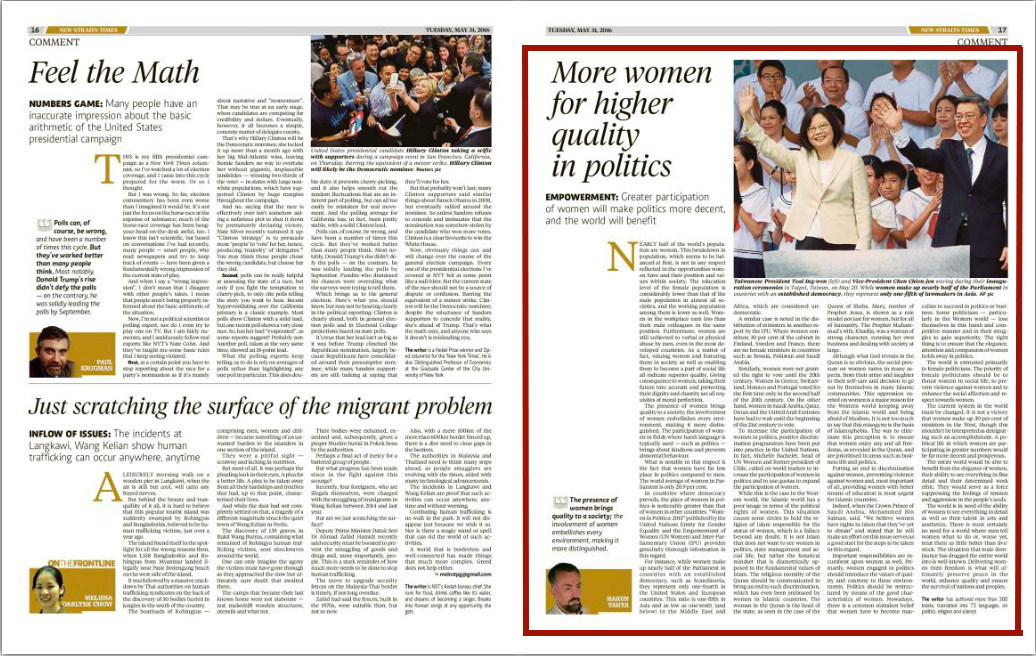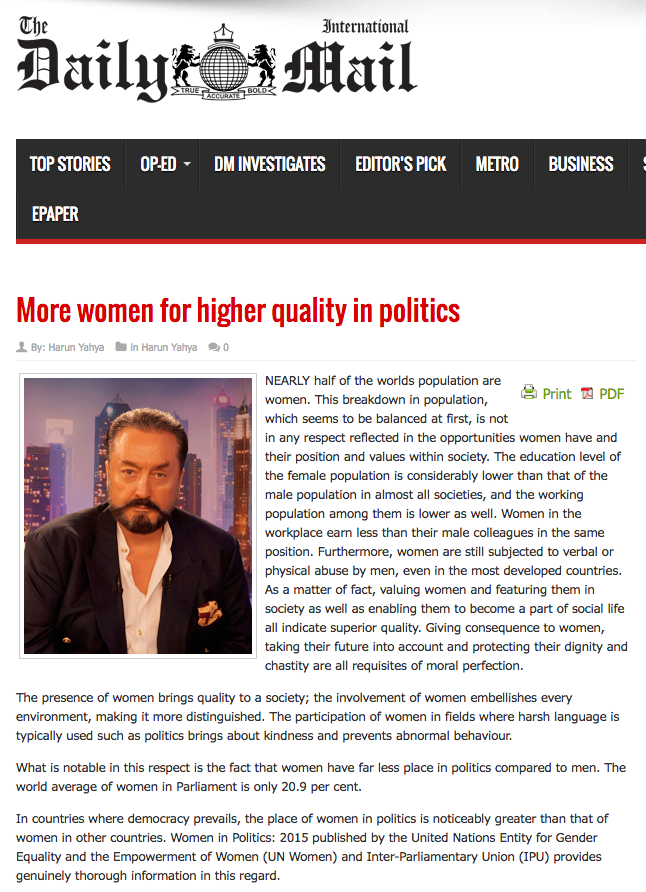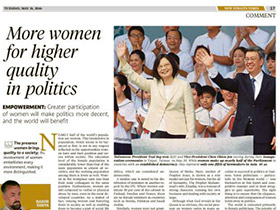
NEARLY half of the world’s population are women. This breakdown in population, which seems to be balanced at first, is not in any respect reflected in the opportunities women have and their position and values within society. The education level of the female population is considerably lower than that of the male population in almost all societies, and the working population among them is lower as well. Women in the workplace earn less than their male colleagues in the same position. Furthermore, women are still subjected to verbal or physical abuse by men, even in the most developed countries. As a matter of fact, valuing women and featuring them in society as well as enabling them to become a part of social life all indicate superior quality. Giving consequence to women, taking their future into account and protecting their dignity and chastity are all requisites of moral perfection.
The presence of women brings quality to a society; the involvement of women embellishes every environment, making it more distinguished. The participation of women in fields where harsh language is typically used — such as politics — brings about kindness and prevents abnormal behaviour.
What is notable in this respect is the fact that women have far less place in politics compared to men. The world average of women in Parliament is only 20.9 per cent.
In countries where democracy prevails, the place of women in politics is noticeably greater than that of women in other countries. “Women in Politics: 2015” published by the United Nations Entity for Gender Equality and the Empowerment of Women (UN Women) and Inter-Parliamentary Union (IPU) provides genuinely thorough information in this regard.
For instance, while women make up nearly half of the Parliament in countries with an established democracy, such as Scandinavia, they represent only one-fourth in the United States and European countries. This ratio is one-fifth in Asia and as low as one-tenth (and below) in the Middle East and Africa, which are considered undemocratic.
A similar case is noted in the distribution of ministers in another report by the IPU. Where women constitute 30 per cent of the cabinet in Finland, Sweden and France, there are no female ministers in countries such as Bosnia, Pakistan and Saudi Arabia.
Similarly, women were not granted the right to vote until the 20th century. Women in Greece, Switzerland, Monaco and Portugal voted for the first time only in the second half of the 20th century. On the other hand, women in Saudi Arabia, Qatar, Oman and the United Arab Emirates have had to wait until the beginning of the 21st century to vote.
To increase the participation of women in politics, positive discrimination programmes have been put into practice in the United Nations. In fact, Michelle Bachelet, head of UN Women and former president of Chile, called on world leaders to increase the participation of women in politics and to use quotas to expand the participation of women.
While this is the case in the Western world, the Islamic world has a poor image in terms of the political rights of women. This situation causes some circles to hold the religion of Islam responsible for the status of women, which is a fallacy beyond any doubt. It is not Islam that does not want to see women in politics, state management and social life, but rather the fanatical mindset that is diametrically opposed to the fundamental values of Islam. The religious morality of the Quran should be communicated to bring an end to such discrimination, which has even been embraced by women in Islamic countries. The woman in the Quran is the head of the state, as seen in the case of the Queen of Sheba. Mary, mother of Prophet Jesus, is shown as a role model not just for women, but for all of humanity. The Prophet Muhammad’s wife, Khadija, was a woman of strong character, running her own business and dealing with society at large.
Although what God reveals in the Quran is so obvious, the social pressure on women varies in many aspects, from their attire and laughter to their self-care and decision to go out by themselves in many Islamic communities. This oppression exerted on women is a major reason for the Western world keeping away from the Islamic world and being afraid of Muslims. It is not too much to say that this misogyny is the basis of Islamophobia. The way to eliminate this perception is to ensure that women enjoy any and all freedoms, as revealed in the Quran, and are prioritised in areas such as business life and politics.
Putting an end to discrimination against women, preventing violence against women and, most important of all, providing women with better means of education is most urgent for Islamic countries.
Indeed, when the Crown Prince of Saudi Arabia, Mohammed Bin Salman, said, “We believe women have rights in Islam that they’ve yet to obtain” and stated that he will make an effort on this issue serves as a good start for the steps to be taken in this regard.
Important responsibilities are incumbent upon women as well. Primarily, women engaged in politics should introduce the values of quality and courtesy to these environments. Politics should be restructured by means of the good characteristics of women. Nowadays, there is a common mistaken belief that women have to become masculine to succeed in politics or business. Some politicians — particularly in the Western world — lose themselves in this harsh and competitive manner and in their struggles to gain superiority. The right thing is to ensure that the elegance, attention and compassion of women holds sway in politics.
The world is entrusted primarily to female politicians. The priority of female politicians should be to thrust women in social life, to prevent violence against women and to enhance the social affection and respect towards women.
The current system in the world must be changed. It is not a victory that women make up 30 per cent of ministers in the West, though this shouldn’t be interpreted as denigrating such an accomplishment. A political life in which women are participating in greater numbers would be far more decent and prosperous.
The entire world would be able to benefit from the elegance of women, their ability to see everything in fine detail and their determined work ethic. They would serve as a force suppressing the feelings of tension and aggression in the people’s souls.
The world is in need of the ability of women to see everything in detail as well as their talent in arts and aesthetics. There is most certainly no need for a world where men tell women what to do or, worse yet, treat them as little better than livestock. The situation that male dominance has dragged the entire world into is well-known. Delivering women their freedom is what will ultimately preserve peace in the world, enhance quality and ensure the survival of nations and peoples.
References:
- http://kadem.org.tr/kadin-siyaset-ve-demokrasi/
- http://www.ipu.org/pdf/publications/wmnmap15_en.pdf
- http://www.ipu.org/press-e/pressrelease201503101.htm
- http://www.un.org/apps/news/story.asp?newsid=41445&cr=un#.VyI3dvmLSUk
- http://english.aawsat.com/2016/04/article55349867/deputy-crown-prince-women-rights-islam-yet-o
Adnan Oktar's piece in New Straits Times & Daily Mail:
http://www.nst.com.my/news/2016/05/148773/more-women-higher-quality-politics
http://dailymailnews.com/2016/06/13/more-women-for-higher-quality-in-politics/



